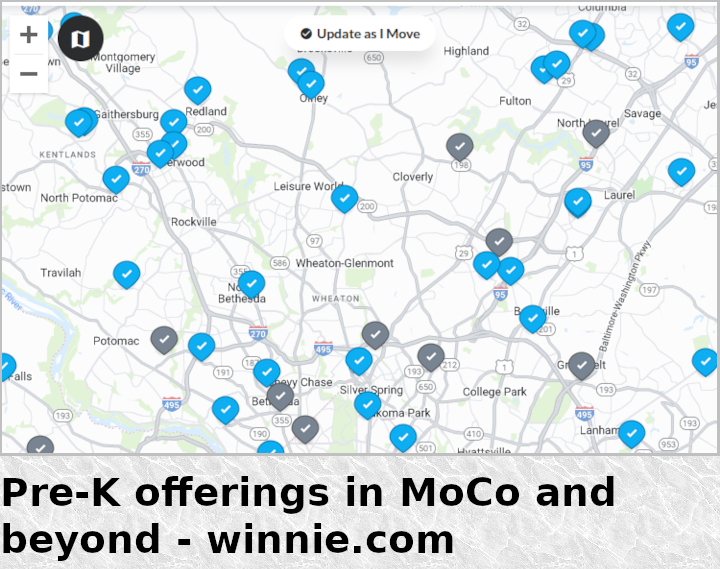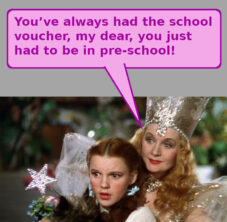Early child care is a remarkable industry, with entrepreneurs, providers, and customers from every demographic participating in the market. Some pre-K providers offer upscale facilities, others work out of their homes, and others work in their customers’ homes. Churches offer pre-K programs out of a sense of mission or as a way to utilize a structure that is otherwise empty during the weekday mornings. The barriers to entry are very low, so it’s difficult to monopolize the industry the way teachers’ unions and school districts monopolize K–12 education.
Montgomery County has dozens of pre-K providers advertised on winnie.com (see lead image), and many others flying under the radar because they are “unlicensed.” As former council member Nancy Navarro said in a press conference:
I had met many unregulated child care providers, mostly women, mostly immigrant women, who wanted to become licensed, and own their own small business, while providing early care and education to children, but were too intimidated by the licensing process.
(If you want to have an unpleasant discussion with a libertarian, focus on licensing. Too often licensing artificially restricts the supply of the good being licensed, forcing both providers and customers into a black market.)
Research in social sciences has become so unreliable and debased (as we saw with UMD’s Kimberly Griffin) that today’s researchers are almost looking for data to support their a prior conclusions. Nevertheless, a very well designed study reported by the National Bureau of Economic Research showed pre-K has enormous, positive, and long-term impact on underserved children. (Although it could be that those underserved children, had they attended high-performing K–12 schools, would not need pre-K.) Regardless, assuming these results are valid, we need to understand why pre-K is beyond the reach of struggling parents. For example, maybe MCPS is attracting too many teachers away from pre-K in favor of useless courses.
Against this background is our local progressives’ listless effort at rolling out universal early child education. Council Member Will Jawando has been promoting this program for a while, and mentioned it in his press release following adoption of the MCPS 2025 budget (my emphasis).
However, I am deeply concerned that the involuntary transfer of teachers to vacant positions, elimination of the virtual academy, and cuts in programming will result in fewer student supports, fewer programs, and delayed implementation of early childhood education programs.
The county government has been looking at universal pre-K since at least 2008, accomplishing almost nothing beyond the state-funded scholarships we discussed in a previous post. Given the lack of progress, we can conclude that pre-K really isn’t a priority; if it were a priority, the County Council would insist that MCPS grant diplomas at the end of 11th grade, privatize 12th grade, and re-allocate the resources to pre-K.
We also have to ask if MCPS and the teachers’ union are the best custodians for pre-K. Both organizations have delivered nepotism, fraud, red-lining, harassment, and declining student achievement for the past decade at least. Imagine forcing a toddler to go to a failing pre-K program just as we force his older brother to attend a failing elementary school. We cannot trust MCPS or the union with courses as useless as Model UN, much less a program as critical to child development as pre-K.
Lastly, we also have to consider the current private-market, pre-K providers. As Ms. Navarro said, many of them are immigrants and women who are serving their friends, neighbors, and cultural communities. Expropriating pre-K from them is a) heartless and b) reduces their income, making pre-K for their own children even less affordable.
This brings us back to school vouchers. The only way to deliver pre-K in an equitable manner, and in a manner that delivers the promises of pre-K, is to empower the parents to entrust their most precious with the providers they trust the most.




